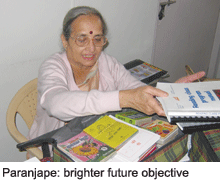Two months ago, six-year-old Sushma Walimbe, a cherubic girl who carries a broken doll with her wherever she goes, spent her mornings playing on heaps of gravel and sand on the construction site of a huge residential complex in Pune. Now, she has a fixed routine and from 9.30 a.m to 12.30 p.m, does her best to learn numbers, the Marathi alphabet and nursery rhymes. What she loves best is to draw houses and paint them in vivid colours. “She has discovered her own gift,” says her teacher Madhuri Gote proudly.
 Sushma is one of the 4,000 children in the three-14 age group in Pune who are now receiving elementary education from Door Step, a mobile school promoted in 1989 by Rajani Paranjape and Bina Laskhari. Started as a community library for Mumbai’s slum children, it moved to Pune in 1993 and gradually transformed into a school providing informal education to children in slums, pavement communities and construction sites. At the height of Pune’s real estate boom of 2003-04, the duo conducted a survey covering 380 construction sites in the city (pop. 5 million) and made a startling discovery. “We found that 4,487 children of people working on these sites were out of school. Their education was not considered seriously by anyone,” recalls Paranjape. Thus was born Door Step School, to offer on-site early education to construction labour children.
Sushma is one of the 4,000 children in the three-14 age group in Pune who are now receiving elementary education from Door Step, a mobile school promoted in 1989 by Rajani Paranjape and Bina Laskhari. Started as a community library for Mumbai’s slum children, it moved to Pune in 1993 and gradually transformed into a school providing informal education to children in slums, pavement communities and construction sites. At the height of Pune’s real estate boom of 2003-04, the duo conducted a survey covering 380 construction sites in the city (pop. 5 million) and made a startling discovery. “We found that 4,487 children of people working on these sites were out of school. Their education was not considered seriously by anyone,” recalls Paranjape. Thus was born Door Step School, to offer on-site early education to construction labour children.
Explaining Door Step’s modus operandi, Paranjape says: “Door Step approaches builders and obtains permission to offer free-of-charge tuition on their sites. Once permission is granted, our trained teachers spend eight hours every day starting at 9.30 a.m teaching children in makeshift premises and sheds converted into functional classrooms, to which builders usually provide basic facilities such as drinking water, electricity, blackboards, stationery etc. Door Step currently employs 200 dedicated full-time teachers.”
Encouraged by the enthusiastic response to Door Step, the school’s management has started a School on Wheels service which is making the rounds of construction sites on the outer peripheries of Pune. A small bus has been converted into an attractive classroom with colourful pictures, charts and interesting books. Paranjape is also in the process of compiling a pictorial dictionary in Marathi with about 800 words to help those who don’t understand the language. “The majority of construction labour families are from Karnataka and Andhra Pradesh and our experience is that their children don’t take much time to learn in Marathi. It’s vital to sow the seeds of knowledge and get them to accept education. Even if they don’t progress to secondary education, if they can read and write, it helps make their future brighter,” she says.
Over the past 16 years, Door Step School has evolved into an organisation of dedicated individuals who reach out to more than 40 communities in over 100 projects catering to 8,000 children in Pune and Mumbai. A drop no doubt in the ocean, but a valuable drop.
Huned Contractor (Pune)